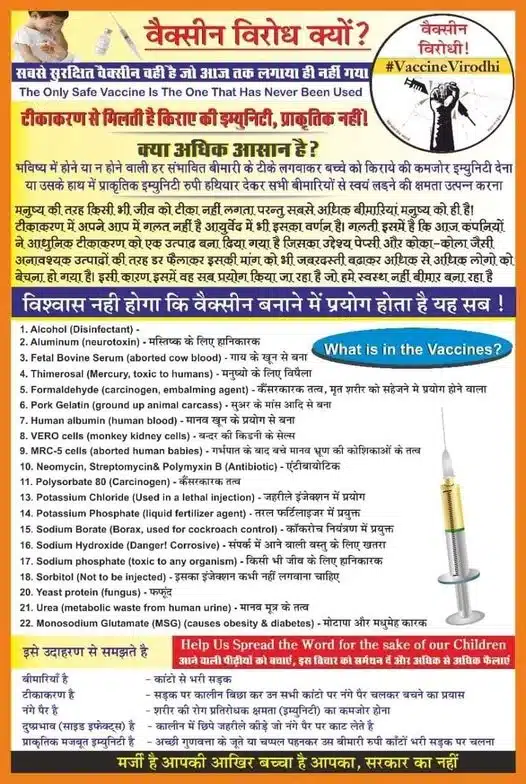The substances listed in the social media post are present in certain vaccines but medical research suggests the levels are not harmful.
A post has been shared on social media platforms listing-out a number of ingredients used in the manufacturing of vaccines. This post is getting popular during the on-going dialogue about the coronavirus vaccine’s safety and development.
The post claims in the heading “Why should we resist against vaccines”. Further, it lists out ingredients present in the vaccines and also claims that “it diminishes your natural immunity against diseases and vaccines have ingredients responsible for making people sick.”
We received this post on Whatsapp and in order to understand how widely this post is being shared on other social media platforms, we did a reverse image search. The results highlighted that this post has been uploaded more than once and has been shared on Facebook here and on Twitter here
However, the claim on social media contains a mix of accurate and inaccurate information. Although the listed products are included in vaccines researchers suggest the levels are not harmful to the public and vaccines are tested for safety before being administered.
Dr. Debanjan Banerjee, a psychiatrist with NIMHANS, Bengaluru, and our fact check member explained, “the way ingredients are portrayed inside the brackets is wrong. It is therefore important to understand the context of their use.”
According to the vaccine knowledge project, “vaccine ingredients can look unfamiliar. But remember that many of the substances used in vaccines are found naturally in the body”.
It explains that many vaccines contain salts based on sodium and potassium which are essential for life. The Vaccine Knowledge Project further highlights that “all vaccine ingredients are present in very small quantities, and there is no evidence that they cause harm in these amounts.”
Products used in making vaccines or growing the active ingredients (parts of the vaccine made from viruses or bacteria which challenge the immune system so that it makes antibodies to fight the disease) may not remain in the final vaccine at all. If they do, they are present only in trace amounts.
So let us look at ingredients about which misleading claims are made like aluminium is a neurotoxin.
Aluminium is one of the most common metals found in nature and is present in the air, food, and water, and many other health products too. As per the U.S Centres for Disease Control and Prevention, “small amounts of aluminium are added to the vaccine to help the body build stronger immunity against the germ in the vaccine”.
Similarly, thimerosal is added to vials of vaccines to prevent the growth of germs like bacteria and fungus in vaccines. According to the CDC, “thimerosal use in medical products has a record of being very safe”.
The above post mentions formaldehyde as a carcinogen. But the human body produces and uses formaldehyde as part of the process of metabolism. According to the Vaccine Knowledge Project, “a pear contains around 50 times more formaldehyde than is found in any vaccine”. Therefore calling it harmful is misleading because it is important to understand the number of ingredients used.
“It is therefore important to understand many of these ingredients are naturally found in the human body but the amount in vaccines is usually 1/100th to 1/500th”, Dr. Banerjee explained.
Also, Polysorbate 80 is a common substance used in food industries. It is used in ice-creams, desserts, and pickled products. According to the CDC, polysorbate 80 is commonly found in the vaccines of influenza as an excipient as it helps other components in vaccines to remain soluble but calling it a “toxic chemical” is misleading.
Furthermore, sodium hydroxide is an acidity regulator and is harmless according to the Vaccine Knowledge Project. These salts used in vaccines are in small quantities and carry no safety concerns. Monosodium Glutamate is also used in the vaccines as a stabilizer which prevents vaccines from environmental conditions such as heat, light, humidity, or acidity while in storage. Also, FDA considers MSG as generally safe, “although many people identify themselves as sensitive to MSG, in studies with such individuals given MSG or a placebo, scientists have not been able to consistently trigger reactions.”
Therefore, all the ingredients listed in the post may be present in some vaccines in small amounts but carry no harmful repercussions. “It looks like the post has been far too stretched to entice others to instantly hate the use of any vaccines,” said Dr. Akshay Jadhav, Pediatrician, Oyster Multispeciality Clinic and Clinical Director, RTWO Healthcare Solutions, Bengaluru who is also our fact check member.
“There are strict guidelines followed which forbid the use of any harmful components and each and every vaccine follows regulatory compliance” he added.
Update: Dr Akshay is a pediatrician with Oyster Multispeciality Clinic and clinical director RTWO healthcare Solutions.


















Add Comment